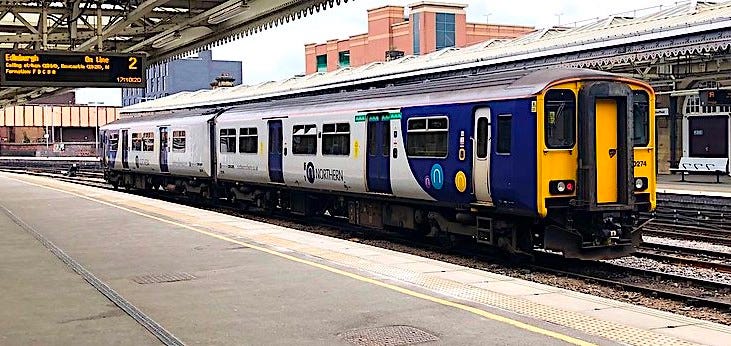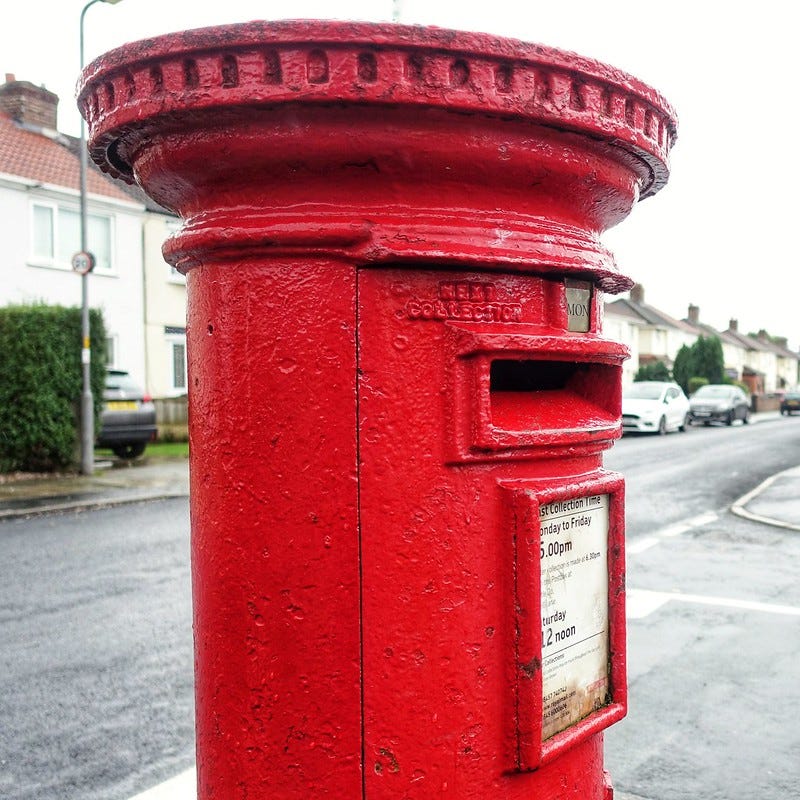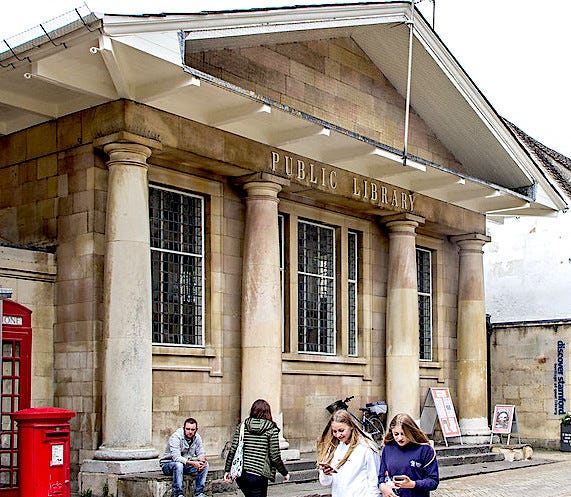Notes from a Mad Island
Navigating the new abnormality
Britain feels normal. It’s good to be home.
I came home for this sense of normality. Walking along a city street or a country lane, everything feels fine and pleasantly familiar after a two-year exile. After a spring of bluebells and grey skies, England has exploded into bloom. I don’t think I’ve ever seen so much blossom at the same time, the blackthorn melds into hawthorn, the flowery candelabra of the chestnuts stand over banks of cow parsley. And look, the elderflower is out!
But Britain is not normal. It’s not just the eye-watering price rises, or the way cameras are proliferating on the roads and in the supermarkets. It’s not the fact that town and city centres are emptier than they used to be, as are some shop shelves because, I’m told, deliveries are less frequent now. It’s not the proposed restrictions on the movement of vehicles or what you can do with your property that make me wonder, a couple of times a week, whether I’ll be able to stay in my native land. And it’s not the stories of obvious craziness that I stumble across on the internet: the council banning the playing of music or of banks closing accounts without explanation.
The sense of abnormality has more to do with the feeling that comes over me when I have to conduct some business that involves dealing with Systems and Organisations. Suddenly I’m catapulted into the rapidly-evolving British matrix, embroiled in a web of unpalatable arrangements which don’t make sense. There’s rarely a comfortable resolution, and trying to make one of the undesirable choices leaves me with the feeling of going a bit mad. It’s hard to put my finger on the atmosphere that gathers around such experiences, but it’s something akin to Kafka meets Bill Bryson.
And so, while I’m in the liminal state of the newly-returned exile looking at my native country through semi-foreign eyes, I’ll chronicle several experiences which illustrate the direction Britain is going in, and then offer a suggestion about what those of us who don’t want to go there might do about it.
I take a train.
Specifically, in the semi-privatised, fragmented system that makes up Britain’s rail network, I take two trains run by Great Western Railway. For background, I have the kind of loathing for GWR that comes from repeated suffering at the hands of another, born of mornings struggling to get to work amid cancellations and failed communications and dark evenings stuffed into two carriages with other commuters.
A few years on, I’ve come to the conclusion that an active life in Britain is virtually impossible without a car. The care home I need to visit is set on busy roads without pavements, the crematorium only gives directions for drivers, and all the taxi firms listed by the venue hosting a family gathering have closed down. The last straw comes when I find myself carrying a lawnmower, part of the way on my head, across south London. I have to buy a vehicle – and this time, it’s going to double up as a mini-camper van.
The madness of Britain makes my search particularly difficult. The upcoming expansion of ULEZ in London, combined with new charges to drive in Bristol and Bath, mean that I need a ‘Euro 6’ vehicle, and the prices of such vans have rocketed. But a friend has put me onto a car that could work as a camper which is only a little over my budget.
The first part of the journey is nonsensical in a way I’ve got used to. I sit in the station using GWR’s wifi to buy my ticket just yards from an idle ticket lady who would charge me a third more. The train is passing through the Brecon Beacons which, it’s just been announced, are to be renamed because the word ‘beacon’ is associated with the burning of carbon, when I hear the clatter of the buffet trolley. The sound generates some internal conflict: buffet services on trains are now card-only, while Alex is cash-only. But I’ve had a stressful morning arranging the finance for the car, and I really, really need a cup of tea. So I make an exception, even accepting the suggestion of a Twix as a homecoming treat.
As the buffet lady prepares the brew, I mention Christian, the seventy-something van-dweller who hadn’t been able to buy a tea on the train because he doesn’t have a bank account. She nods in acknowledgement. GWR, she explains, 'couldn't afford' to keep taking cash because the security company charges an astronomical sum to deal with money. Anyway, she is 'very lucky' because whenever there’s a passenger like my man in a van, there’s always a customer nearby prepared to pay for them digitally.
I am wondering about this, whether it really is so that a major train company cannot afford to accept cash. (There are plenty of ticket inspectors: during a journey of less than two hours my ticket is checked four times.) And how has it become normal for a company to create a situation where the burden of compensating for an exclusionary business decision falls to kind passengers?
But now I am looking at the plastic lid that has been placed on the fold-out table beside me. 'Where will you put your tea bag?’ says the buffet lady reprovingly when I try to refuse it. She rejects my suggestion that I could use the napkin she has also provided, but it is as I wish. The plastic lid is whisked away, but when the tea is put down it’s firmly topped with … a plastic lid.
I give up at that point and retreat into a baffled silence. The woman’s contorted reasoning is affecting my sense of sanity and I need to keep my focus on the business of the day. While in a country ostensibly concerned about Equality and Environment, these behaviours are contradictory, there is a logic to them. They make business cheaper and easier for GWR and the woman, as a loyal employee, is simply repeating what she has been told. Since coming home, I’ve heard many such corporate rationalisations; the server 'has to' dispense hot drinks with a plastic lid otherwise they won’t be ‘safe’; it’s not ‘hygienic’ to provide glasses of water when plastic bottles stand in the fridge. Useless to point out that most plastic ends up in the sea, and that other countries don’t make it central to the consumption of liquids. The corporate reasons prevail.
The car, by the way, is super. As a 2015 Peugeot Partner, she’s just in the compliant category that will allow me to drive in Britain’s major cities without being charged. Activities that were difficult or impossible become possible again: I can get to places without making elaborate, costly plans and I can transport things for the house and garden.
But I’m aware that my membership of the compliant elite and the freedom of movement it gives me is time-limited. At some point, the requirements will change, and I’ll join the hoi-polloi obliged to circle Britain’s cities and be excluded from driving in Greater London without paying daily taxes. How will I maintain my property then?
But that way madness lies. I’ll move on.
I open my post.
Apart from a kit to test my faeces which I never requested, there’s a letter from an organisation called Our Future Health asking me to take part in a new research programme. The organisation wants access to my health records and some of my blood. The letter says Our Future Health got my details from NHS Digital, the new body responsible for data systems in healthcare.
This is curious, because I distinctly remember going onto the NHS Digital website last year and opting out from having my medical information shared with third parties for ‘research and planning’. So I write to NHS Digital saying this. In due course, I receive a reply that opens with an injured tone and suggests I’m Missing Out: ‘We're sorry to hear that you're not happy about being approached by Our Future health asking you to take part in what will be the UK’s largest ever health research programme.’
Checking the website of Our Future Health confirms my suspicions that conflicts of interest are being institutionalised; I’m unhappy to learn that I am not on the opt-out lists. The email from NHS Digital provides the link by which I can extricate myself but when I follow it, the system tells me that ‘my data does not match’ their records, So I write to them again, and they send me the same link, again.
It maddens me, this bureaucratic adoption of systems and processes that claim to be responding to the wishes of the individual while in reality making it difficult for people to accomplish what they want. It is, a friend reminds me, a form of the ‘structural violence’ by which social institutions do harm.
But what maddens me more is the silent abandonment of the core principles of western medicine, a system of healthcare based on informed consent, individualised patient care and patient confidentiality. How many millions of Brits have no idea they’re automatically opted in to share their medical records with profit-making companies?
But, I console myself, amid this jumble of corporate and state interests, there’s a glimmer of light. Just eighteen short months after the World Health Organisation announced its intention to create a new legally-binding public health regime, a handful of MPs and at least two mainstream media outlets are waking up to the fact that this would end life in Britain as we know it.
I go to the supermarket.
Specifically, Lidl. I’m surprised when the cashier asks me if I’ve parked in the car park which, unusually, I have as I’m trying to stock up after my winter away. I should scan my receipt, she says, pointing to a gadget in another area. I haul over my shopping and, juggling various bags, scan my receipt with difficulty, watched by the cashier and another customer. Finally, a green light flashes. ‘It’s worked,’ pronounces the customer.
I leave, congratulating myself on escaping a fine: I wouldn’t have known the policy had changed if I’d used the self-checkouts. The fine would have been £90 and friends in Bristol have just got two of them. Reflecting on the fact that Lidl is also one of the first supermarkets to install close-up cameras that film you while you scan your goods, I decide not to shop there again.
A week later, I get a fine anyway.
I go to the library.
It’s the library in the little town where I used to live. I’ve booked a small meeting room to teach an online class because I’m in my first week of campercar living and, lovely as she is, she's not a teaching vehicle.
I arrive at the library forty minutes before the class to make absolutely sure I get set up in time. But getting online proves impossible. Wiltshire Council has devised a system which involves getting a password by phone but there’s no signal in the library. The librarian sends me outside to the car park. And then a second time, with the instruction to stay there longer as it can take a while for the signal to come through. I make a test call. Still no password.
The librarian is helpful and comes up with the workaround of using the library email address. But one after another of the supplied passwords is rejected. The librarian thinks it’s something to do with the fact I’m using a Mac. At some point in all this I pass a remark about the ill-wisdom of a system that requires people to hang about in a car park. ‘Security!’ admonishes another, nearby librarian. She looks as shocked as if I’d questioned the doctrine of the Trinity. And so, with minutes to go, I resort to a BT hotspot which gets me online no sooner than you can say ‘credit card details’.
‘We’ve had so many problems with the wifi,’ says Helpful Librarian afterwards. Couldn’t the council change the system? She shakes her head sadly. They’ve told the council about the problems many times, but the council ignores them. They would just have to tell people that booking a room doesn’t necessarily mean you will be able to use the library wifi. Anyway – she nods to a small group tapping away on their laptops at the other end of the library – some people are all right.
I leave it there. It’s not my town any more. Wiltshire Council is probably not fulfilling its statutory obligations with respect to equality of access, but if the locals find that normal, so be it.
Meanwhile, the geopolitical world keeps turning. If you know of anyone from a poor country who’s prepared to risk their life and take that of others in exchange for British citizenship, here’s the advert:
Funny old world.
Looking at the above experiences, a few things strike me forcibly.
The first is that the trouble is coming from the top, from institutions, organisations and corporations. When confronted with obstacles, ordinary people are generally reasonable and practical, understanding the situation in a human way and often trying to help.
But the growing power of systems and organisations is making individual choices and finding human(e) solutions to problems more and more difficult. The gap between institutions, be they governments or supermarkets, and the public is growing to the point where you could be forgiven for thinking that the interests of the two groups are opposed and the relationship between them a hostile one.
It’s a divide familiar to me, having travelled in countries where the authorities routinely impose requirements that are unreasonable or impossible to meet. These countries are considerably poorer than Britain, but there’s one big difference: elsewhere, people tend to be aware of the gap between their interests and those of the authorities, and act accordingly. Much of the time it doesn’t even occur to them to attempt to be ‘compliant’ with what would make life unliveable. They make arrangements among themselves and, when ignoring the state becomes impossible, find ways around, including resorting to benign forms of corruption.
The growing requirements and restrictions in Britain are creating and embedding new divisions. You can have a cup of tea if you have a bank account, but not otherwise. You can enter a city centre if you have the right vehicle, but not otherwise. You can shop at the supermarket, but only if you accept the possibility of fines. You can access the public library wifi if you have the right device, but not otherwise.
Do you ever wish you could be like the people who think everything’s fine? asks a friend.
Yes, I say. Several times a week. It would be so much easier not to notice these things, to brush them off as insignificant or as an ‘inevitable’ part of ‘progress’.
But no, not for a second do I genuinely accept them as good for human flourishing. I don’t want to live in a world riven by divisions fostered by governments and corporations, in systems that erode human agency, cooperation and the spontaneity of life.
So if pretending normality is not the way out of this, what is?
Noticing, first of all. The bulk of this piece has been an exercise in that, as has much of the discussion among us ordinary folk about the changes in the world over the past three years.
But the response cannot stop at noticing and talking about what we’ve noticed. After that, we have to start making different choices.
We’re at the fork in the road now. I’m hearing more and more people talking about wanting to get away from the madness, to opt out. Such a turning-aside from the system can take various forms and work to different degrees, from cancelling the TV licence to de-registering from the electoral register, from avoiding supermarkets to homeschooling children.
I’m also hearing plausible predictions of society splitting into two groups, the first continuing in the mainstream, accepting the growing regulation of their lives in exchange for promises of safety and convenience. The second, the minority, will be more rooted in nature and less connected to technology. Those who choose to belong to this group will necessarily be more self-sufficient in both practical and psychological ways.
It will take time and a lot of working out to take the road less travelled, because it also means building the road. Some, perhaps all of us, will die during the course of the road building. But at least we will have made a start in creating a future that looks hopeful and, well, human.
Two roads diverged in a wood, and I—
I took the one less traveled by,












Oh Alex almost every encounter you had resonates with me (I'm currently based in Wilton, Wiltshire). It is mad, and sitting looking out on the River Nadder it's also beautiful and I can't think of living anywhere else. And there is this sense of the two roads, but constantly I'm wondering how connecting the two is possible so there's passage between the two - or at least through to the human and more-than-human? Few answers, but thanks for the sharing... we are not alone!
Wow, it sounds uncomfortably like the U.S., though with less loud complaining and more quiet desperation, as you Brits have a wont to do. Glad to see you speaking (or writing) out about this and bringing it to Light. I might add only that as people withdraw from the system, we must also re-establish community because none of us can do everything alone. We need each other, and that is actually how we will survive what's coming, in my opinion.